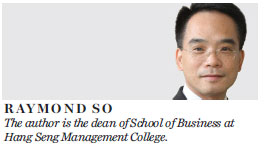Political reform will affect economic development
Updated: 2015-04-30 07:23
By Raymond so(HK Edition)
|
|||||||
Last week the government announced its proposal for constitutional reforms. The motion will be referred to the Legislative Council (LegCo) to vote before this year's summer recess. In response to the government's announcement, the "pan-democrats" protested by leaving the LegCo chamber. Of course, this was not unexpected. It was a symbolic gesture by the "pan-democrats" to express their opposition. But it also highlights the contentious issues facing Hong Kong in future.
The "pan-democrats" have clearly demonstrated their opposition to constitutional reform. The government also made it clear there would not be any major modifications to its reform package. If one is to judge from current attitudes on both sides, the constitutional reform package probably will not be passed. Of course, anything can happen in the next two months.
I am not so concerned about politics. Rather, I am more concerned about Hong Kong's economic development after introduction of the electoral reform. Economic development allows people to improve their lives. It enables society to progress. Economic development also helps people to become innovative. Yet, constitutional reform and disputes will influence Hong Kong's economic development. When Hong Kong is facing difficult times due to the reform, economic development will be adversely affected.
Many commentators have expressed concern that Hong Kong's days of rapid development ended after the handover. Instead of working hard toward advancing society, Hong Kong has had 17 years of disputes and disagreements. In the past, people did not consider judicial reviews to be a risk during the implementation of policies. However, today judicial reviews frequently affect policy decisions. Many people believe the British colonial government performed better than the SAR government. But in reality there were also many problems during the colonial era. In the past, democratization lay dormant and public opinion had little influence. But many things have changed since 1997. Today, Hong Kong's leaders cannot afford to ignore public opinion.
Public opinion became more diverse after the handover. The SAR government needs to find out the views of public before any major policy is implemented. More discussions are needed in LegCo. All these will no doubt delay the decision-making process. By definition, there will be different views during any consultation. The end result will affect decisions on economic policies. If we were to develop the Shatin, Tsuen Wan and Tuen Mun new towns now, these key projects would not be easy to get through LegCo. Controversial constitutional reform will ultimately have a profound impact on economic development.
If the reform proposals are not passed, there will not be any significant constitutional developments in the foreseeable future. The economic impact will also be negative. Hong Kong has already experienced years of slower economic development. The free market can only expand and prosper if the political climate remains calm. In the current political climate new legislation cannot be passed quickly. Every motion is treated independently. Consequently, there is little coherence when it comes to the implementation of policies. This is not to say that government departments are unwilling to cooperate. The government can only do things in a piecemeal way and hope most lawmakers in LegCo vote in favor of its motions.
This system clearly is substandard because the best arrangements are not always possible. Implementing policies independently or individually from each other also affects the development of a holistic economic approach. This will be detrimental to long-term economic development.
If the electoral reform package is passed, things will be different. Hong Kong will face a new political landscape and also new economic challenges. Chief Executive candidates will have to be more accountable to the voters of Hong Kong. This means they won't present policies which are superficial. The current reform proposals still have many contentious issues which need to be resolved. Regardless of whether the reform is passed, economic uncertainty will still remain.
What should Hong Kong do? This is a test for the collective wisdom of its people. To accept or to reject a plan may seem easy. Those in power can always justify their actions. But we have to take into account things such as international competition, the livelihoods of 7 million people and our future economic plans. Consequently, the next two months will be a crucial time in Hong Kong's development.

(HK Edition 04/30/2015 page10)